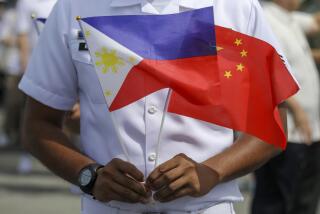Taiwan, China bolster transit links
- Share via
BEIJING, AND TAIPEI, TAIWAN — In a landmark move that chips away at decades of tension and distrust, China and Taiwan agreed Tuesday to allow direct, regularly scheduled shipping and air service for the first time across the 110-mile strait separating the longtime adversaries.
The deal delivers on campaign pledges by Taiwanese President Ma Ying-jeou, who took power in May vowing to boost the island’s economy by improving relations with China. Both sides also agreed to hold high-level talks every six months and further strengthen economic ties. An estimated 1 million Taiwanese live and work on the mainland.
But in a sign of the divisions that define Taiwan’s young democracy, about 7,000 police officers were deployed to protect the Chinese envoy, Chen Yunlin, from protesters when he arrived to sign the deal. Chen’s hotel was ringed by nets to prevent thrown eggs and rotten vegetables from hitting him.
Last month, Chen’s deputy was insulted and manhandled by protesters during a trip to Taipei, the Taiwanese capital. Later, a massive protest march was held in Taipei, and more demonstrations were planned this week.
As Chen landed Monday, critics hung banners along the route to his hotel. “Get Lost Communist Bandit,” read one.
Critics accuse Ma of moving too quickly and “selling out” Taiwan, a charge he sharply denies. Some, including leaders of the opposition Democratic Progressive Party, or DPP, also fear the island’s territory and unique identity will be swallowed up by its giant neighbor.
China and Taiwan split in 1949 after a civil war that saw the Nationalists flee to Taiwan and the Communists take over the mainland, setting the stage for decades of enmity. China has vowed to unify the two, by force if necessary. Tuesday’s deal is part of a warming trend after eight years of tense cross-strait relations while the independence-leaning DPP held sway in Taiwan.
After the signing, Chen and his Taiwanese counterpart, Chiang Pin-kung, shook hands, sipped champagne and held up calligraphy that read: “Peacefully negotiate; jointly create a win-win situation.”
Most elements of the deal had been discussed for years, and, in many ways, amounted to relatively noncontroversial economic measures that the two wary sides could easily agree on. Continued progress, however, will probably require the expertise of skilled diplomats able to finesse the perilous and deeply emotional issues of identity, sovereignty and political control. Polls show most Chinese favor unification, whereas most Taiwanese favor the status quo.
The deal paves the way for direct shipping links across the Taiwan Strait for the first time in more than half a century, which should help speed up factory production, save industries hundreds of millions of dollars annually and encourage closer economic integration.
The pact also increases the number of weekly passenger flights to 108 from 36, expands the number of Chinese airports served to 21 from 5 and, for the first time, allows about 60 cargo flights a month. It also allows for direct flights, rather than continuing to divert through Hong Kong airspace.
Direct postal service will also be introduced, as will new food safety procedures. China’s tainted-milk scandal angered many Taiwanese, underscoring a development gap between the two societies.
--
More to Read
Sign up for Essential California
The most important California stories and recommendations in your inbox every morning.
You may occasionally receive promotional content from the Los Angeles Times.













